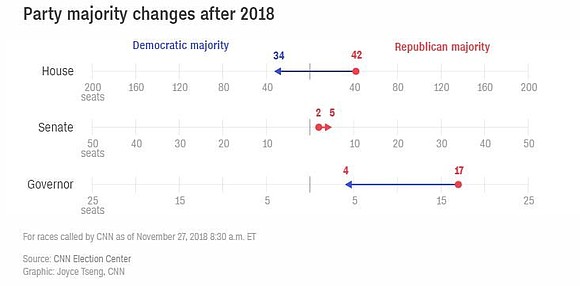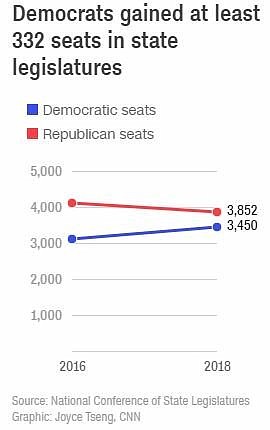The 2018 blue wave, in 3 charts
CNN/Stylemagazine.com Newswire | 11/28/2018, 11:48 a.m.
By Z. Byron Wolf and Joyce Tseng, CNN
(CNN) -- The full extent of Democrats' victory in the midterms has been amplified in the weeks since Election Day.
Mail-in results in California have meant that candidates who were behind when everyone went to bed that night have since surged forward to victory. That was also the case in the Arizona Senate race and in many House races.
In CNN's reporting after Election Day, it seemed like Democrats would flip a net of somewhere in the neighborhood of 30 House seats. Now it appears that, with all but one House races called, their take will be 40 -- if the remaining race, California's 21st Congressional District, falls to Democrat T.J. Cox, who just this week pulled ahead of Rep. David Valadao in the vote count.
It is true that Democrats lost a net of two seats in the Senate -- they picked up Republican seats in Arizona and Nevada, but lost seats in Florida, North Dakota, Missouri and Indiana. But the map, which had them defending 10 seats in states won by Donald Trump in 2016, favored Republicans to begin with.
They also picked up governors races in the Midwest, a critical area they lost to Trump in 2016 and could help the Democratic nominee chart a course to defeating him in 2020. Less covered but more important will be their gains in state legislatures. Democrats still badly trail Republicans in control of state chambers, but they picked up a net of six along with at least 332 state legislators, according to the National Conference of State Legislators.
By another measure, although functionally meaningless, they also have reason to be happy. In 2016, Hillary Clinton won the popular vote by more than 3 million votes. Democrats edged Republican House candidates in 2018 by nearly 9 million.






